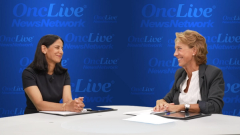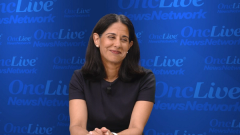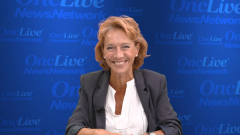
Ongoing Clinical Trials With ADC Therapy in HR+ Metastatic Breast Cancer
Breast medical oncologists close out the program on HR+ metastatic breast cancer by highlighting ongoing clinical trials with antibody-drug conjugate therapy.
Episodes in this series

Transcript:
Sara M. Tolaney, MD, MPH: The only thing I’ll bring up about the new ADCs [antibody-drug conjugates] coming out is that there is also datopotamab deruxtecan, which is also a deruxtecan-based ADC, but targets Trop-2. Similar to T-DXd [trastuzumab deruxtecan] targeting HER2, this is targeting Trop-2 with the same payload as T-DXd. This is similar to the idea of sacituzumab targeting Trop-2, but they’ve presented some early data in triple-negative disease, which looked very impressive, in pretreated disease with about a 30% response rate and 50% if you excluded patients who had had prior topoisomerase 1 inhibition. We haven’t seen the data yet from hormone receptor-positive patients; they had conducted an expansion cohort in their phase 1 setting. But there is an ongoing phase 3 trial, the TROPION-Breast01 study. This is randomizing patients to get datopotamab deruxtecan or to get treatment of physician’s choice who’ve had 1 to 2 prior lines of chemotherapy in the metastatic setting. If that study is positive, this whole thing is going to blow up in terms of our treatment paradigm, because what do we think about sacituzumab and T-DXd….
Eva M. Ciruelos Gil, MD, PhD: It’s like many different options, that’s true. The last question is, do you think that these fantastic data with HER2 disease in general, and breast cancer in particular, that we’ve been seeing in the pretreated and advanced disease setting, will similar results also be seen in the early, first-line setting? The tumor is not the same, and there is more expression of different oncogenic antigens as the tumor progresses. The microenvironment is changing, vasculature is changing, and all of these things are important for an ADC, which is a complex extractor, to get to the right place. I don’t know its role in adjuvant treatment. There isn’t a microscopic tumor there, or in the first-line setting, or neoadjuvant. I’m not so sure that its efficacy in pretreated patients…would it have the same degree of efficacy in less pretreated patients or in the neoadjuvant setting? Do you have any opinion on that?
Sara M. Tolaney, MD, MPH: It’s a very good question. Again, the ADC data in the metastatic setting are impressive and robust, but I think the question is going to be if it can replace chemotherapy in an early stage patient. We saw some hints of data at ASCO [American Society of Clinical Oncology annual meeting]. There were data presented for the preoperative sacituzumab study, the NeoSTAR trial, with just 4 cycles of preoperative sacituzumab in triple-negative disease. There was about a 30% pCR [pathologic complete response] rate. It was only 4 cycles, but to me it suggested that it is a robust agent, even in the preoperative setting. We need more data to understand duration and combination. Can it replace part of the chemotherapy, or all of the chemotherapy? I think we’re going to have to see, but given the data that we’ve seen with trastuzumab deruxtecan, it begs the question: can this agent help us in our early disease patients and help cure more patients? It’s clearly better than standard chemotherapy for metastatic disease, but is it going to be better than, for example, ACT [doxorubicin, cyclophosphamide, paclitaxel]?
Eva M. Ciruelos Gil, MD, PhD: Sure.
Sara M. Tolaney, MD, MPH: I think that’s a movement we need to go in, but your question is a good one. Is it going to have the same efficacy in an early stage patient or not? This is my very simplistic way of thinking, but if ADCs are just a mechanism to deliver chemotherapy into a cell with a target, if the target is there, and this chemotherapy is so potent and works, then hopefully it should help us replace chemotherapy. But again, we clearly don’t understand the biology and mechanism of action as clearly as I wish we did.
Eva M. Ciruelos Gil, MD, PhD: I’m afraid it’s much more complicated than that.
Sara M. Tolaney, MD, MPH: Exactly.
Eva M. Ciruelos Gil, MD, PhD: It’s so complicated to make decisions in clinics, but we are medical oncologists and we are trying to fight against death. We’re fighting against a very difficult situation, which is progressive cancers. We’ll manage with our algorithms, and we’ll keep helping patients as much as possible. Thank you for being here with me.
Sara M. Tolaney, MD, MPH: Thank you very much.
Eva M. Ciruelos Gil, MD, PhD: It’s a pleasure.
Transcript edited for clarity.







































